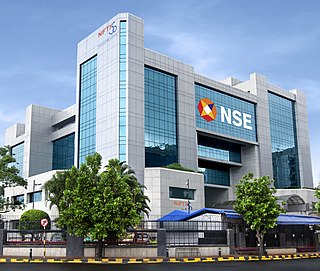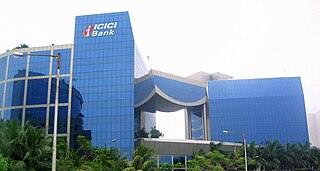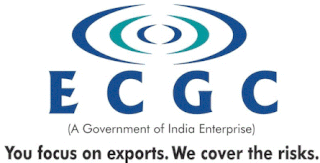Related Research Articles

State Bank of India (SBI) is an Indian multinational public sector bank and financial services statutory body headquartered in Mumbai, Maharashtra. It is the 48th largest bank in the world by total assets and ranked 178th in the Fortune Global 500 list of the world's biggest corporations of 2024, being the only Indian bank on the list. It is a public sector bank and the largest bank in India with a 23% market share by assets and a 25% share of the total loan and deposits market. It is also the tenth largest employer in India with nearly 250,000 employees. In 2024, the company’s seat in Forbes Global 2000 was 55.

National Stock Exchange of India Limited (NSE) is one of the leading stock exchanges in India, based in Mumbai. NSE is under the ownership of various financial institutions such as banks and insurance companies. It is the world's largest derivatives exchange by number of contracts traded for the fifth consecutive year and the third largest in cash equities by number of trades for the calendar year 2023 It is the 7th largest stock exchange in the world by total market capitalization, exceeding $5 trillion on May 23, 2024. NSE's flagship index, the NIFTY 50, is a 50 stock index that is used extensively by investors in India and around the world as a barometer of the Indian capital market. The NIFTY 50 index was launched in 1996 by NSE.

ICICI Bank Limited is an Indian multinational bank and financial services company headquartered in Mumbai with a registered office in Vadodara. It offers a wide range of banking and financial services for corporate and retail customers through various delivery channels and specialized subsidiaries in the areas of investment banking, life, non-life insurance, venture capital and asset management.

Modern banking in India originated in the mid of 18th century. Among the first banks were the Bank of Hindustan, which was established in 1770 and liquidated in 1829–32; and the General Bank of India, established in 1786 but failed in 1791.
The IDBI Bank Limited is a Scheduled Commercial Bank under the ownership of Life Insurance Corporation of India (LIC) and Government of India. It was established by Government of India as a wholly owned subsidiary of Reserve Bank of India in 1964 as Industrial Development Bank of India, a Development Finance Institution, which provided financial services to industrial sector. In 2005, the institution was merged with its subsidiary commercial division, IDBI Bank, and was categorised as "Other Development Finance Institution" category. Later in March 2019, Government of India asked LIC to infuse capital in the bank due to high NPA and capital adequacy issues and also asked LIC to manage the bank to meet the regulatory norms. Consequent upon LIC acquiring 51% of the total paid-up equity share capital, the bank was categorised as a 'Private Sector Bank' for regulatory purposes by Reserve Bank of India with effect from 21 January 2019. IDBI was put under Prompt Corrective Action of the Reserve Bank of India and on 10 March 2021 IDBI came out of the same. At present direct and indirect shareholding of Government of India in IDBI Bank is approximately 95%, which Government of India (GoI) vide its communication F.No. 8/2/2019-BO-II dated 17 December 2019, has clarified and directed all Central/State Government departments to consider IDBI Bank for allocation of Government Business. Many national institutes find their roots in IDBI like SIDBI, EXIM, National Stock Exchange of India, SEBI, National Securities Depository Limited. Presently, IDBI Bank is one of the largest Commercial Banks in India.

Small Industries Development Bank of India (SIDBI) is the apex regulatory body for overall licensing and regulation of micro, small and medium enterprise finance companies in India. It is under the jurisdiction of Ministry of Finance, Government of India headquartered at Lucknow and having its offices all over the country.

The Ministry of Finance is a ministry within the Government of India concerned with the economy of India, serving as the Treasury of India. In particular, it concerns itself with taxation, financial legislation, financial institutions, capital markets, currency regulation, banking service, centre and state finances, and the Union Budget.

BASIX is an institution concerning the promotion of livelihood established in 1996 in India. It is headquartered in Hyderabad, Telangana. Around 2010 it's NBFC arm raised funds from private equity investors and declared bankruptcy after couple of years.
Axis Bank Limited, formerly known as UTI Bank (1993–2007), is an Indian multinational banking and financial services company headquartered in Mumbai, Maharashtra. It is India's third largest private sector bank by assets and fourth largest by market capitalisation. It sells financial services to large and mid-size companies, SMEs and retail businesses.

ECGC Limited is a government owned export credit agency of India. It is under the ownership of the Ministry of Commerce and Industry, Government of India, and is headquartered in Mumbai, Maharashtra. It provides export credit insurance support to Indian exporters and banks. Its topmost official is designated as Chairman and Managing Director.
Non-Banking Financial Company (NBFC) is a company registered under the Companies Act, 1956 of India, engaged in the business of loans and advances, acquisition of shares, stock, bonds, hire-purchase insurance business or chit-fund business, but does not include any institution whose principal business is that of agriculture, industrial activity, purchase or sale of any goods or providing any services and sale/purchase/construction of immovable property.

Infrastructure Leasing & Financial Services Limited (IL&FS) is an Indian state-funded infrastructure development and finance company. It was created by public sector banks and insurance companies.
The first introduction of a mutual fund in India occurred in 1963, when the Government of India launched the Unit Trust of India (UTI). Mutual funds are broadly categorised into three segments: equity funds, hybrid funds, and debt funds.
SBI Life Insurance Company Limited is an Indian life insurance company which was started as a joint venture between State Bank of India (SBI) and French financial institution BNP Paribas Cardif. SBI has a 55.50% stake in the company and BNP Paribas Cardif owns a 0.22% stake. Other investors are Value Line Pte. Ltd. and MacRitchie Investments Pte. Ltd., holding a 1.95% stake each while the remaining 12% is free float stake with public investors. It has Assets under management(AuM) worth ₹352,422 crore (US$42 billion) and a Gross Written Premium(GWP) of ₹67,320 crore (US$8.1 billion) as of March 2023. SBI Life has an authorized capital of ₹20 billion (US$240 million) and a paid up capital of ₹10 billion (US$120 million).
Religare Enterprises Limited (REL) is an Indian investment and financial services holding company, headquartered in New Delhi. REL is listed on National Stock Exchange of India and Bombay Stock Exchange. It is registered with the Reserve Bank of India (RBI).

The Kerala Financial Corporation (KFC), a public sector undertaking, is a state-owned financial corporation. The Kerala Financial Corporation (KFC) was established by the State Financial Corporations Act of 1951, passed by the Kerala Legislative Assembly, to accelerate the industrial growth of the state of Kerala. The corporation was formally founded as the Travancore Cochin Financial Corporation on 1st December 1953 and was later renamed Kerala Financial Corporation in 1956 following the state's reorganization. KFC now has 21 branch offices with its headquarters in Thiruvananthapuram.
Bandhan Bank Ltd. is a banking and financial services company, headquartered in Kolkata.
Dr. Sailendra Narain is a development finance specialist born in Nawadah, Bihar Province, India. For over 40 years, Narain has been a pioneer in developing the global SME sector. His specialities include: designing policy frameworks for SME Growth, establishing SME financing programs in banking and development financial institutions, and capacity building for SMEs with a focus on Entrepreneurship.
SBI Mutual Fund is an Indian private asset management company introduced by the State Bank of India (SBI) and incorporated in 1987 with its corporate head office located in Mumbai, India. SBIFMPL is a joint venture between the State Bank of India, an Indian public sector bank, and Amundi, a European asset management company. A shareholder agreement in this regard has been entered on April 13, 2011, between SBI & AMUNDI Asset Management. Accordingly, SBI currently holds 63% stake in SBIFMPL and the 37% stake is held by AMUNDI Asset Management through a wholly owned subsidiary, Amundi India Holding. SBI & AMUNDI Asset Management shall jointly develop the company as an asset management company of international repute by adopting global best practices and maintaining international standards.
Financial regulation in India is governed by a number of regulatory bodies. Financial regulation is a form of regulation or supervision, which subjects financial institutions to certain requirements, restrictions and guidelines, aiming to maintain the stability and integrity of the financial system. This may be handled by either a government or non-government organization. Financial regulation has also influenced the structure of banking sectors by increasing the variety of financial products available. Financial regulation forms one of three legal categories which constitutes the content of financial law, the other two being market practices and case law.
References
- 1 2 "Reserve Bank of India - Reports".
- ↑ "Archived copy" (PDF). Archived from the original (PDF) on 2013-04-25. Retrieved 2013-04-24.
{{cite web}}: CS1 maint: archived copy as title (link) - ↑ Dion Global Solutions Limited. "IDBI Bank - Company History". Moneycontrol.com. e-Eighteen.com. Retrieved 11 October 2011.
- ↑ D. K. Murthy, K. R. Venugopal (2009). Indian Financial System. I. K. International Pvt Ltd.
- ↑ "SIDBI".
- ↑ "IDBI Investment Management Co IIMCO Floor VK Shah Morg Nariman Bhavan Mumbai Maharashtra".
- ↑ "idbi cap".
- ↑ "SIDC of himachal pradesh". Archived from the original on 2011-10-05. Retrieved 2011-09-26.
- 1 2 "Mutual Funds". Archived from the original on 2011-09-12. Retrieved 2011-09-26.